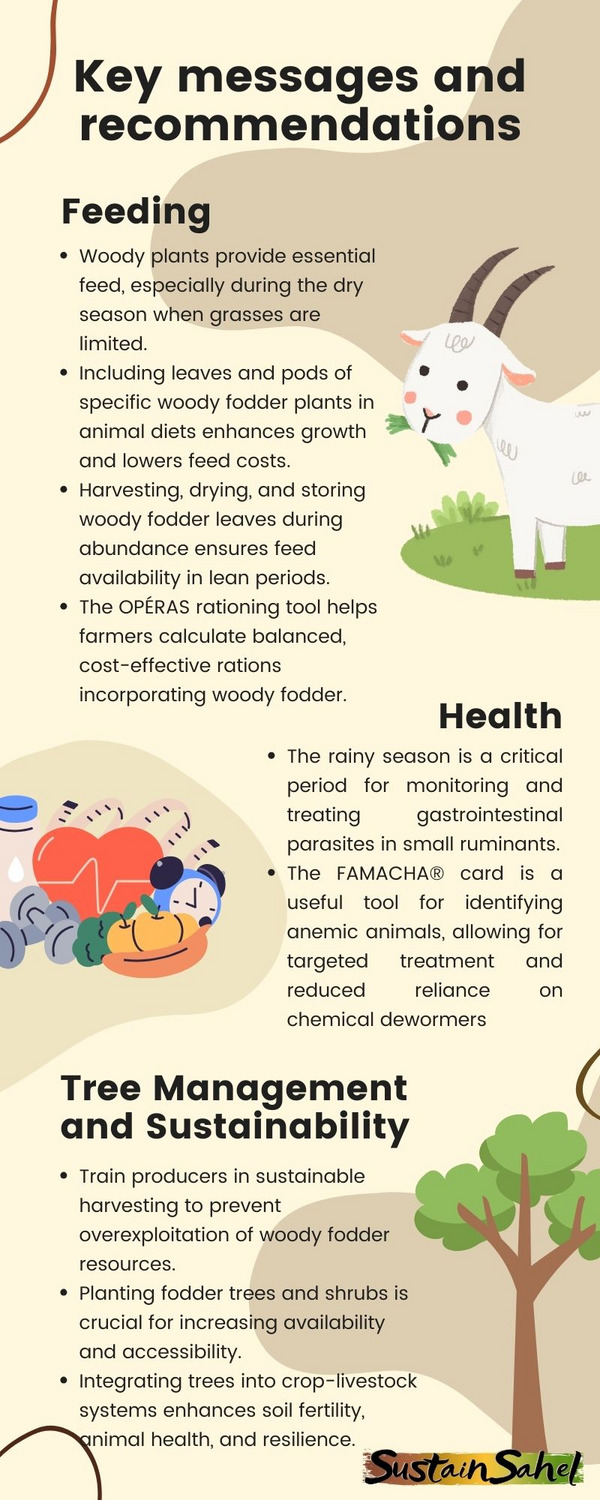The SustainSahel project, and in particular work package 6: Benefits of shrub foliage for livestock husbandry, has made significant strides in disseminating its research findings on the use of woody fodder for enhancing livestock production and health across the projects’ focus areas in Burkina Faso, Mali, and Senegal.
Through a series of workshops, field days, and innovation platform (IP) meetings held between 2022 and 2024, the project effectively engaged with local communities, researchers, and students. Key messages, as shown in more detail in graphic 1, focused on:
- The importance of incorporating leaves and fruits from locally growing woody plants into animal feed, especially during the dry season.
- The benefits of collecting, drying, and preserving these leaves for use during feed shortages.
- The positive impact of specific woody fodder species on animal growth and health.
For instance, the project demonstrated that incorporating leaves of Khaya senegalensis, Pterocarpus lucens, and Anogeissus leiocarpus into sheep’s diets resulted in a good quality manure that led to higher cereal yields compared to manure from sheep on diets that contained no browse fodder. Additionally, feeding fresh Khaya senegalensis leaves during the rainy season helped reduce intestinal parasites in sheep.
The project also developed and tested the spreadsheet-based OPÉRAS rationing tool, which assists farmers in formulating balanced feed rations based on woody fodder, further contributing to sustainable livestock management practices.
Dissemination efforts extended beyond direct farmer interaction, with project members actively participating in international conferences such as Tropentag, publishing scientific articles, and contributing to the SustainSahel website. The project also prioritized capacity building by involving numerous students in its activities. BSc and MSc students from various universities and institutions in the region conducted research on related topics, contributing to the project's scientific outreach.
Next steps
The work of disseminating these finding doesn’t stop here; the project will continue to promote the adoption of key messages through leaflets, videos, and other dissemination materials, facilitate the establishment of tree and shrub nurseries and support producers in planting and managing woody fodder species. There are plans to conduct further research to confirm the effectiveness of specific woody fodder plants for animal health and growth performance, as well as strengthen collaboration with stakeholders, including farmers' organizations and local authorities, to ensure the sustainability of interventions.
Conclusion
SustainSahel's successful dissemination of research findings underscores its commitment to improving livestock production and health in West Africa. By promoting the integration of woody fodder into livestock management systems, the project is creating a more sustainable and resilient future for the region.
Further information
Weblinks
- Accessagriculture.org: Video ‘Managing intestinal nematodes in small ruminants’

 tap and then scroll down to the Add to Home Screen command.
tap and then scroll down to the Add to Home Screen command.